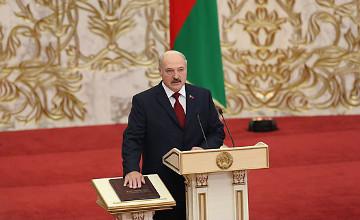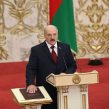
Belarus and Published Opinion-Making
Publication: Eurasia Daily Monitor Volume: 12 Issue: 205
By:

In early November, journalists and analysts convened in Tallinn, Estonia, for the fifth annual meeting of the “Rubicon” conference fully devoted to issues pertaining to Belarus. This year, the major topic was “Belarus as a factor of regional security and stability.” The participants were unable to come to a consensus on whether Belarusian President Alyaksandr Lukashenka is a Kremlin vassal or whether the tail may actually be wagging the dog. Roman Yakovlevsky, who is active on Charter 97, the most rigid online opposition outlet, and Arkady Moshes, of the Finnish Institute for International Affairs, leaned toward the former qualification. Whereas, Valer Karbalevich and Yury Drakakhrust of the Belarusian service of Radio Liberty insisted on the latter. Karbalevich even opined that in foreign affairs, Belarus is “much more independent” from Russia than Estonia is from the European Union or the North Atlantic Treaty Organization (NATO). “There are [typically] no wars between a vassal and the suzerain,” declared Karbalevich, whereas all sorts of wars—from those on natural gas to information wars—broke out repeatedly between Minsk and Moscow; and even now, the parties are “in a clinch” about the issue of the Russian airbase, which Russia wants to open on Belarusian territory. Since the annexation of Ukraine’s Crimean peninsula was greatly aided by the Russian naval base in Sevastopol, it is perfectly understandable why Lukashenka is firmly against the Russian airbase initiative (Naviny.by, November 4).
The situation, however, is less straightforward than it seems—a point that unbending democracy promoters in the West have had a hard time grasping. Thus, according to Drakakhrust, if Belarus’s regime somehow gives way to a pro-European government, the entire country could possibly become a Donbas of sorts, as even now about 20 percent of Belarusians are aggressively pro-Russian. According to the Russian liberal analyst Vladislav Inozemtsev, the current political regimes in Russia and Belarus will “linger until the physical death of their leaders.” Yet, in both cases, this will be followed by chaos “because the personalistic regimes do not lend themselves to peaceful successions.” Inozemtsev also claimed that Belarus has no reason to fear falling out of Russian President Vladimir Putin’s favor because the Eurasian integration project is too important for him; and however paradoxical it may seem, Belarus “can count on obtaining anything it wants from Russia” (Naviny.by, November 4).
Several participants of the conference argued that Lukashenka, faced with economic problems, will imitate reforms but will hardly move beyond that. Indeed, several days after the conference, Lukashenka’s aide Kirill Rudyi declared there is no grassroots demand for economic reform in Belarus. To counter that, Alexander Klaskovsky, a veteran opposition journalist, quoted early 20th century American automobile manufacturer Henry Ford: “If I had asked people what they wanted, they would have said faster horses.” In any case, according to Sergei Nikolyuk, a Belarusian political philosopher, the type of popular legitimation of the existing political regime in Belarus has recently changed. Whereas for a long time, it was “loyalty in exchange for income,” now it is “loyalty in exchange for survival.” The Ukrainian crisis should be credited with this sort of shift. Andrei Vardomatski, a sociologist, worded this slightly differently when he remarked that Lukashenka’s popularity rating, formerly based on the economy, is now fundamentally “a security rating.” As Nikolyuk argued, in Belarus, the threat of neo-totalitarianism is the “response of an inadequately modernized society to modern challenges.” Both Lukashenka and about 60 percent of all Belarusians are leery of competition, and the entire culture is not innovation-prone (Naviny.by, November 5).
The beleaguered and self-annihilating Belarusian opposition was also not spared criticism at the conference. Alexander Yaroshuk, a trade union leader, even proposed that it is time for all the opposition parties to disband and to create a mass movement modeled after the Polish Solidarity of the 1980s (Euroradio.fm, November 3). Indeed, several days after the conference, five Belarusian opposition leaders signed a petition asking the EU to organize an intra-Belarusian dialogue about democratization (Tut.by, November 3). But this gesture came across to many politically minded Belarusians as a symptom of the domestic opposition’s ultimate helplessness. After all, the authoritarian regime will only talk to a strong adversary, which the Belarusian opposition is not (Naviny.by, November 5). Predictably, Tatyana Korotkevich, the only member of the opposition who had collected the minimum 100,000 signatures needed to run in the October 2015 presidential elections, did not sign the petition. Pavlyuk Bykovsky (now a freelancer, but formerly long associated with the newspaper Belarusy i Rynok) opined, however, that Korotkevich proved the theory long advocated by Nikolyuk, according to which it does not matter who the opposition’s presidential candidate would be—he or she could count on about one-fifth of the electorate no matter what, due to the ossified nature of Belarusian society and domestic politics. “Even my apolitical wife would be able to win the voice of this part of the electorate,” Nikolyuk repeatedly claimed. The one-fight figure, in fact, roughly corresponded with the portion of voters predicted to back Korotkevich, according to surveys conducted prior to the presidential elections (Naviny.by, November 8; see EDM, October 7, 20).
Considering the opposition’s morass as well as the Lukashenka government’s seemingly unshakable power position and its policies of cautiously reaching out to the West, it is little wonder that the spokesmen and envoys of the Western world increasingly see official Minsk as the only reasonable negotiation partner. Recently, two representatives of the US State Department—Deputy Assistant Secretaries Bridget Brink and Robert Berschinski—made some encouraging and friendly statements upon visiting the Belarusian capital. Even regarding the potential Russian airbase, they declared that Washington has always been in favor of each country choosing military allies on its own (Tut.by, November 5). In turn, the World Bank commended the National Bank of Belarus for its commitment to reform and even warned, quite realistically, that reforming an economy that is unstable could bring about unforeseen consequences (Tut.by, November 2).
As Winston Churchill once quipped, “There is no such thing as public opinion. There is only published opinion.” It seems the published opinion about Belarus is changing and it is notable that Belarus itself has had little to do with this change. But the external factors that are truly bringing it about make one eternally skeptical about the process of published opinion-making as such.




